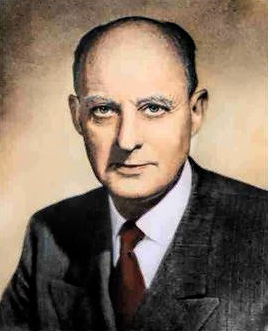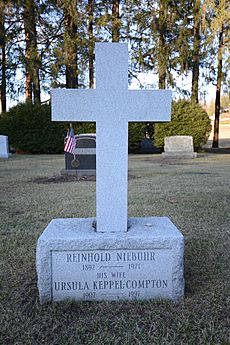Reinhold Niebuhr facts for kids
Quick facts for kids
Reinhold Niebuhr
|
|||||||
|---|---|---|---|---|---|---|---|
 |
|||||||
| Born |
Karl Paul Reinhold Niebuhr
June 21, 1892 |
||||||
| Died | June 1, 1971 (aged 78) |
||||||
| Years active | 1915–1966 | ||||||
| Spouse(s) |
Ursula Niebuhr
(m. 1931) |
||||||
| Relatives | H. Richard Niebuhr (brother) | ||||||
| Awards | Presidential Medal of Freedom (1964) | ||||||
|
|||||||
| Alma mater |
|
||||||
|
Notable work
|
|
||||||
| Scientific career | |||||||
| Institutions | Union Theological Seminary | ||||||
| Academic advisors | Douglas Clyde Macintosh | ||||||
| Doctoral students |
|
||||||
| Other notable students | Tom Collings | ||||||
| Influences |
|
||||||
| Influenced |
Masao Abe
W. H. Auden Dietrich Bonhoeffer Robert McAfee Brown Frederick Buechner E. H. Carr Jacques Ellul Jimmy Carter Hillary Clinton William Sloane Coffin Nelson Cruikshank Gary Dorrien Jean Bethke Elshtain Samuel Ifor Enoch Gabriel Fackre J. King Gordon Douglas John Hall Richard Hofstadter Myles Horton Samuel P. Huntington George F. Kennan Howard Kester Martin Luther King Jr. Christopher Lasch Alexander Miller William Lee Miller Hans Morgenthau Barack Obama Samuel DeWitt Proctor Arthur M. Schlesinger Jr. Seymour Siegel Alec Vidler Kenneth Waltz Cornel West |
||||||
Reinhold Niebuhr (1892–1971) was an important American thinker, professor, and religious leader. He taught at Union Theological Seminary for over 30 years. He was known for his ideas about how religion, politics, and public life connect.
Niebuhr was one of America's leading public thinkers in the 20th century. He received the Presidential Medal of Freedom in 1964, a very high honor. His most famous books include Moral Man and Immoral Society and The Nature and Destiny of Man. He is also famous for writing the Serenity Prayer, which is used by many people around the world.
Niebuhr started as a minister who cared deeply about working-class people. He first believed in pacifism (opposing war) and socialism (a system where the community owns and controls production). However, his ideas changed over time. He developed a way of thinking called Christian realism, which looked at the world more practically. He believed that while people want to do good, they also have a tendency towards selfishness. This means that perfect societies are not possible.
After World War II, Niebuhr supported America's efforts to stand up to Soviet communism. He was a powerful speaker and influenced many people in the 1940s and 1950s. He debated with other religious leaders, arguing against views he saw as too simple or too narrow. Many important people, including presidents like Barack Obama and Jimmy Carter, have said Niebuhr influenced their thinking.
Contents
Reinhold Niebuhr: A Thinker for Our Time
Early Life and Education
Reinhold Niebuhr was born on June 21, 1892, in Wright City, Missouri. His parents, Gustav and Lydia Niebuhr, were German immigrants. His father was a pastor in the German Evangelical church. The family spoke German at home. Reinhold's brother, H. Richard Niebuhr, also became a famous religious thinker.
The Niebuhr family moved to Lincoln, Illinois, in 1902. Reinhold attended Elmhurst College in Illinois and graduated in 1910. He then studied at Eden Theological Seminary and Yale Divinity School. He earned two degrees from Yale, finishing in 1915. He felt that Yale helped him think more broadly, beyond his German-American background.
Marriage and Family Life
In 1931, Niebuhr married Ursula Keppel-Compton. She was from England and studied theology and history at the University of Oxford. She also taught at Barnard College in New York.
Reinhold and Ursula Niebuhr had two children: Elisabeth and Christopher. Ursula Niebuhr also helped her husband write some of his later works.
Serving in Detroit
In 1915, Niebuhr became a pastor at Bethel Evangelical Church in Detroit, Michigan. When he arrived, the church had 66 members, but it grew to almost 700 by 1928. This showed his ability to connect with many different people.
Detroit was growing fast due to the automobile industry, attracting many new residents. During this time, groups like the Ku Klux Klan (KKK) became very strong in Detroit. The KKK was against Black, Jewish, and Catholic Americans. Niebuhr spoke out against the Klan publicly, calling them "one of the worst specific social phenomena." He helped influence the decline of the Klan's political power in Detroit.
World War I and Patriotism
When America joined World War I in 1917, Niebuhr was a pastor in a German-speaking church. Many German-Americans faced suspicion. Niebuhr stressed the importance of being loyal to America. He also thought deeply about patriotism and pacifism (being against war). He believed that sometimes, one must support war to achieve peace and justice.
Caring for Workers
Niebuhr was very concerned about the lives of factory workers in Detroit. He saw how hard and tiring the work was, especially in places like the automobile factories. He became a strong critic of Henry Ford and the difficult conditions in his factories.
Niebuhr allowed union organizers to speak at his church. He believed that factory work could be "drudgery and toil is slavery" for the workers. He wrote in his diary that people often enjoy the products of factories without knowing the human cost. His concern for workers helped him become known across the country.
Moving to New York and New Ideas
In 1928, Niebuhr left Detroit to become a professor at Union Theological Seminary in New York. He taught there until he retired in 1960. He influenced many students, including the German minister Dietrich Bonhoeffer.
In the 1930s, Niebuhr helped start the Fellowship of Socialist Christians. This group believed that capitalism did not fit with Christian ethics. They were not Communists but were interested in Karl Marx's ideas about society. Niebuhr also helped create the International Rescue Committee (IRC), which helps people suffering from conflict and disaster.
Niebuhr's Evolving Theology
Niebuhr's thinking changed a lot in the 1930s. He moved away from some of the more hopeful ideas of his earlier years. He developed what is called neo-orthodox theology. He emphasized that the Bible helps us understand human nature and our purpose.
Niebuhr believed that humans have a tendency towards "pride" and selfishness, which he called "sin." This pride can be seen not just in bad people, but also in those who think they are always right. He argued that this human tendency to corrupt good things is present in governments, businesses, and even churches. He explored these ideas in his book Moral Man and Immoral Society.
Politics and Global Events
Domestic Politics
In the 1930s, Niebuhr was a leader in the Socialist Party of America. However, he disagreed with some of the more extreme Marxist views. In 1941, he helped start the Union for Democratic Action, which supported a strong American role in the world and liberal policies at home. This group later became the Americans for Democratic Action.
International Politics
Niebuhr's ideas, known as Christian realism, led him to support America's involvement in World War II. He believed that a victory by Germany and Japan would be a threat to Christianity. He left his pacifist group, the Fellowship of Reconciliation, and became a strong supporter of the war. He argued that while pacifism represents ideal love, it cannot stop evil in the real world.
Niebuhr also supported the idea of containing (stopping the spread of) Soviet communism during the Cold War. However, he later spoke out against the Vietnam War. He believed that using the atomic bomb on Hiroshima in 1945 was "morally indefensible."
Niebuhr's ideas influenced many important figures in American foreign policy. He taught that humans are imperfect, and power needs to be balanced. He warned against thinking America was perfect or always right.
Views on Society and Other Faiths
Race and Equality
Niebuhr spoke out against the Ku Klux Klan in Detroit in the 1920s. He defended the idea that many different groups of people could live together peacefully.
His views on racial justice developed over time. While he was against racial inequality, he initially warned against forcing changes that could lead to violence. However, after seeing the problems in Northern cities and the violence during civil rights protests in the 1960s, he changed his mind. He then supported stronger actions to achieve equality.
Working with Other Religions
Niebuhr had good relationships with the Jewish community throughout his life. He was an early critic of antisemitism (hatred of Jewish people) and strongly opposed Nazism in Germany.
Early in his career, he thought Christians should try to convert Jews. But within a few years, his views changed. He became the first major Christian thinker to say that Christians should not try to convert Jews. He believed that both Christianity and Judaism had important things to offer each other. He suggested that they should work together.
Niebuhr supported Zionism, the movement for a Jewish homeland in Israel. He believed a Jewish state was necessary because minority groups often face prejudice. He saw his support for Zionism as practical, not based on religious predictions.
The Serenity Prayer
Niebuhr is widely believed to have written the famous Serenity Prayer. The earliest known version, from 1937, credits him with it. The most popular version of the prayer says:
God grant me the serenity to accept the things I cannot change,
Courage to change the things I can,
And the wisdom to know the difference.
Lasting Influence
Many important thinkers and leaders have been influenced by Reinhold Niebuhr. These include political scientists like George F. Kennan and Hans Morgenthau, and historians like Arthur M. Schlesinger Jr..
His ideas were very important for Protestant religious leaders after World War II. While his influence lessened later in his life, there has been new interest in his work recently. Both John McCain and Barack Obama mentioned Niebuhr as an influence during the 2008 presidential election. Obama called him his "favorite philosopher" and "favorite theologian."
Niebuhr's ideas about human imperfection and the limits of power continue to be studied by those who think about international relations and American foreign policy.
Legacy and Honors
Reinhold Niebuhr passed away on June 1, 1971, in Stockbridge, Massachusetts.
- He received several honorary doctorates during his lifetime.
- In 1947, he was elected to the American Philosophical Society.
- President Lyndon B. Johnson gave Niebuhr the Presidential Medal of Freedom in 1964.
- New York City named West 120th Street, where Union Theological Seminary is located, "Reinhold Niebuhr Place" in his honor.
- Elmhurst College, where he studied, created the Niebuhr Medal to honor him and his brother.
Niebuhr's ideas were most influential during the early years of the Cold War. His work has seen a renewed interest, especially after the events of September 11, 2001.
Personal Style
Niebuhr was known as a very engaging speaker. People described his voice as deep and his eyes as large and blue. He used his hands like an orchestra conductor, pointing to emphasize his words. He spoke quickly and without notes, but he was skilled at building his arguments and showing his passion for what he was saying.
Selected Works
- Moral Man and Immoral Society: A Study of Ethics and Politics (1932)
- The Nature and Destiny of Man: A Christian Interpretation (1943)
- The Children of Light and the Children of Darkness (1944)
- The Irony of American History (1952)
See also
 In Spanish: Reinhold Niebuhr para niños
In Spanish: Reinhold Niebuhr para niños
- Christian socialism
 | Dorothy Vaughan |
 | Charles Henry Turner |
 | Hildrus Poindexter |
 | Henry Cecil McBay |


